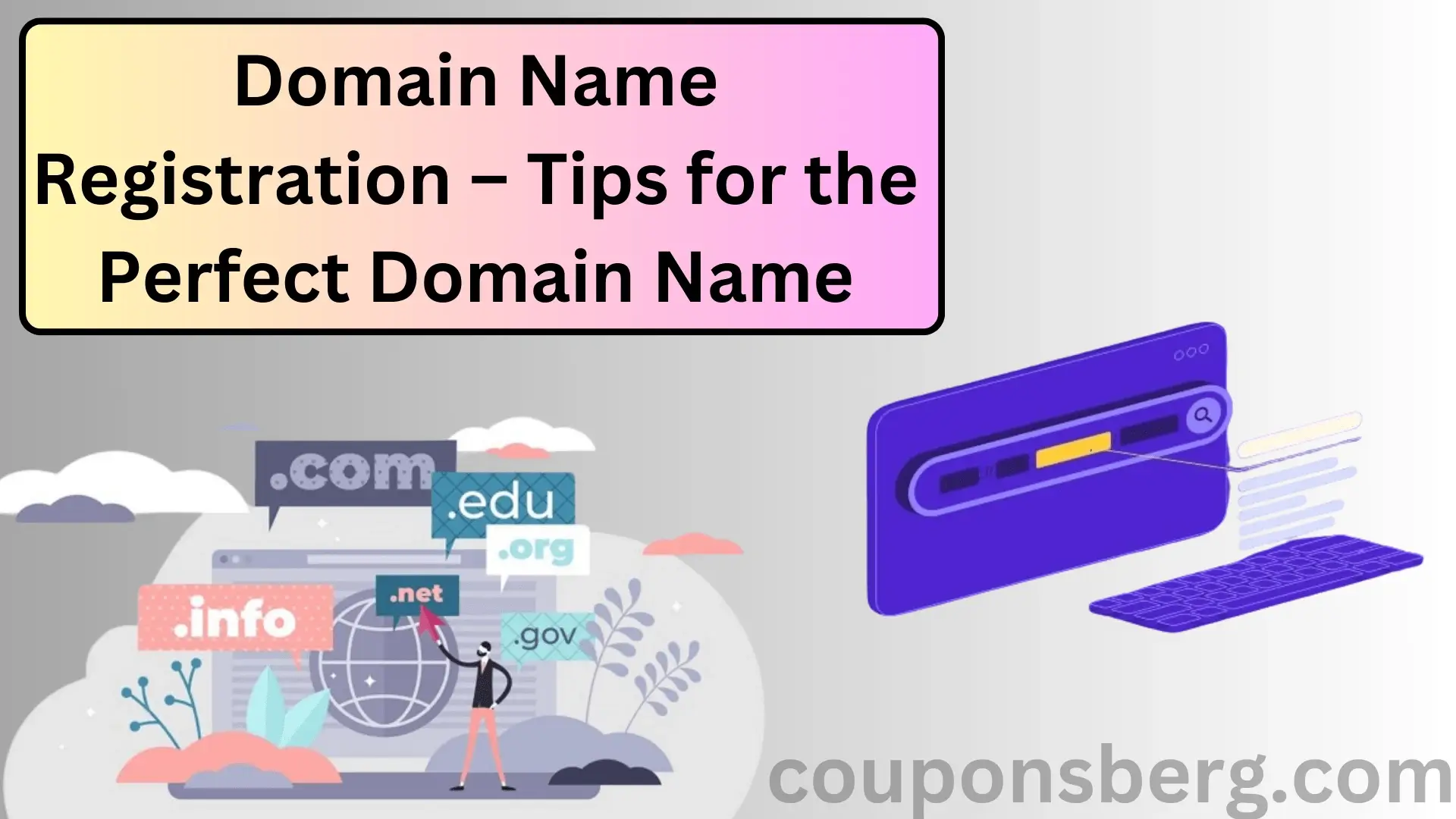Domain Name Registration : Selecting the ideal domain name is arguably the most important stage in the process of creating a website. The most well-known websites on the Internet, such as Facebook, Amazon, eBay, and so forth, were all the result of some dice throwing and brainstorming. You need a name first, though, because your website might be the next big thing on the internet.
The name should be memorable and simple for people to find, while also representing your brand and your objectives. Your future success depends on selecting a memorable name because you want people to remember it ten years from now, not just today.
This post delves deeply into the process of selecting the ideal domain name, discusses common brainstorming mistakes, and outlines what to do when you’ve narrowed down your list of potential names.
Why Your Domain Name is Crucial to Your Website’s Success?

1. Your First Impression
One of your only opportunities to establish a good first impression when a user finds your website through a search engine is through your domain name. A weak domain name may be ignored, while a good domain name will encourage people to visit your link.
2. Your Domain Name is Your Brand
For many years to come, your brand will be defined by your domain name. Should you first select a trendy or uninteresting domain name that contains colloquial terms or is inspired by a fad, your brand can eventually become obsolete.
3. Improve Your SEO Ranking
If you’ve ever established a website, you are aware that one of the most important parts of site management is search engine optimisation. It establishes your website’s position in search engine rankings, which in turn affects traffic. Along with other strategies, picking a strong domain name with effective keywords is a great method to improve your SEO.
The Brainstorming Process

Now for the exciting part: the brainstorming session! It’s time to compile a list of names that could represent your brand throughout the duration of your website, so grab some coffee, a notepad, and your team. These are our suggestions for coming up with a memorable yet useful domain name:
1. Make It Easy to Pronounce
Our brains recall and process words and names through a process called fluency processing. To create the ideal domain name, you must comprehend this. Most significantly, being able to pronounce anything improves processing fluency, which can have a more positive effect. You want visitors to your website to be able to tell others about it.
Furthermore, when someone tries to search for your domain name, they are likely to misspell it if it is difficult to pronounce. Since most of us have short attention spans when using the internet, you should definitely avoid doing this. If we can’t spell a website name correctly the first few times, we’ll probably just look somewhere else.
2. Make It Intuitively Descriptive
Your domain name need to be instantly recognisable and convey the essence of your offerings—whether they goods, services, or website content. For example, you would undoubtedly anticipate to find inexpensive pet toys if you happened upon the website “CheapPetToys.”
Because visitors might infer information about your website’s content from the domain name alone, a descriptive website can also help you stick out in their minds.
3. Don’t Use Slang in Your Name
Although slang terms are entertaining to use in conversation and make for hilarious jokes, it is not a smart idea to base your domain name and brand on slang terminology. If you associate your name with popular terms, it’s nearly a guarantee that your domain will become obscure in a matter of years. You want your name to have lasting significance and memorability.
Furthermore, non-native speakers in other countries or even in your community might not get the reference if your domain name contains slang terminology. Remain straightforward and use phrases that will stand the test of time.
4. Don’t Forget About Social Media Sites
When compiling your list of potential domain names, make sure to consider potential social media profiles. Nothing is more annoying than selecting the ideal domain name only to learn that Facebook, Instagram, and Twitter pages already have the same name.
You should be aware that the pages are accessible in case you desire to establish your social media presence later, even if you don’t intend to link social media profiles when your website first launches.
5. Keep Keywords in Mind
As was previously discussed, selecting your domain name is a great way to advance your SEO plan. Think about the terms you want to use on the website itself when choosing a domain name. To improve your website’s search engine rankings, use keywords that accurately describe your goods and services and are easy to search.
Tips for the Perfect Domain Name

The best domain names are frequently chosen by accident; there is no secret formula or method for selecting the ideal domain name. Having said that, these are the factors you should take into account while coming up with ideas for your website’s domain name.
1. Find a “.com” if Possible
While there are many distinctive domain name extensions available, such “.me” or “.social,” nothing compares to the prestige and history of “.com.” As a matter of fact, 75% of all websites on the Internet end in.com, lending a more conventional and businesslike appearance to your website.
“.com” extensions are typically more expensive than other extensions due to their widespread popularity. You can buy a “.org,” “.net,” or “.co” for less money if you can’t afford a “.com,” or if it’s already owned by someone else (more on this later).
Choose a country-specific extension like “.co.uk” or “.ca” if you are operating within your home country and do not intend to reach out to visitors from other countries. These extensions are more reasonably priced and demonstrate your pride in your own nation.
2. Keep it Short and Sweet
Longer names seldom really stick in the minds of your visitors, however short names are simple to recall. The only drawback is that single-word domains with six characters or fewer can fetch thousands of dollars, and many short, one-name words are already taken.
Hope exists! Your brand might still be able to use the domain name if it has a super-metal, distinctive name. If not, you can use a few techniques to come up with a unique, short domain name.
You may either go back to the drawing board and create something original that suits your brand’s image and how you would like to be perceived by potential clients, or you can put an adjective or verb in front of your proposed domain name and see if it is available.
It’s inevitable that someone will type your website incorrectly when searching; this is a fact of life. In order to get around this, we advise you to register several spelling variations, if at all possible, and forward each one to your official website.
Additionally, by registering these spelling variations, you’ll prevent your rivals from snatching them up and profiting from your misspelt domain name. Grab the traffic to your website that you are due and make sure to grab these variations.
4. Don’t Use Numbers
Another attempt to keep customers from becoming confused: if your domain name contains numbers, they might not remember if your website was originally called “supplies4school.com” or “suppliesforschool.com.” Simply put, your domain name should be.
5. Don’t Hesitate
Don’t be afraid to register a wonderful name you come up with, provided you have the funds. Every second, new domain names are being registered and claimed, so the perfect name that is accessible now could not be available tomorrow.
Narrow Down Your List

After you’ve compiled a sizable list of your top domain names, it’s time to investigate these names to find out which are available, which are already taken, and which you might be able to buy.
We choose to classify taken domains into four groups:
- Valid Companies
- Squatters of Domains
- Domains In Progress
- No Content Pages
Legitimate Businesses
If a domain search leads you to a legitimate company’s website, you should drop that domain from your list of potential domains. They are a legitimate company, therefore it’s unlikely that they will want to part with their website domain, and even if they do, their asking price might be much above your budget.
Domain Squatters
When you visit these websites, you will recognise them. Usually, it applies to plain domain names like “sunglasses.com,” where no actual business is conducted. Rather, you are greeted with links and ads. These domains are primarily bought with the intention of making money off of them. The buyer then holds the domain as an investment, hoping that big businesses will eventually approach them with an offer of enormous sums.
Domains Under Construction
You may assume one of two things when you search for the domain name and get the familiar “under construction” message: either the owner is actively working on developing the website on the domain, or they purchased it some time ago and completely forgot about it.
Dead Pages
The website may still be accessible even if it cannot be accessed. Making the decision to follow up on these dead pages can be difficult and have several possible outcomes. It all depends on your level of desire for the domain and the identity of the domain owner.
Buying a Domain Name That’s Already Taken

Here are the next steps to locate the domain owner and submit a purchase offer for the domain after you have categorised your list of domains.
Tracking Down the Domain Owner
It’s easy to find the owner of a domain by typing the domain name exactly into the WHOIS domain search or another registrar website. You ought to see the name and contact information of the domain owner once your search is finished. As you begin your domain name search, bear in mind that the domain owner may occasionally have their contact information restricted by privacy protection agencies.
It’s time to approach the domain owner once you have their contact data, if you are determined to buy it. It’s not as easy as saying, “Hey, sell me your website.” It matters how you go about things.
Making Your Approach
You can choose to get in touch with the domain owner personally if this is your first time purchasing a domain and you don’t have any records of flipping domains. Your mail is just a straightforward question without any sort of offer.
You can get a small law firm or even a registrar to contact the domain owner on your behalf if you don’t want to communicate with them directly. Alternatively, you can create a “burner” email address that contains no personal information.
Determining the Domain’s Value
The following stage, if the domain is available, is to collaborate with the domain owner to reach a mutually agreeable price. A few distinct factors influence a domain’s value determination, such as:
- Length of character
- Quantity of words
- Common name
- The advantages that could accrue to your company
- The name’s catchiness
Your budget and the return on investment (ROI) from buying the domain will determine how much you offer the owner. For instance, how much would you value each customer if you were to purchase “Cheap.com” for your company that sells a range of goods at discounted costs? Ascertain the answers to these inquiries in order to value the domain name sensibly.
Negotiations

If you want to continue further with discussions with the domain owner, there are certain points to keep in mind.
1. If You Can’t Justify the Price, Walk Away.
Certain domain owners may ask you to pay hundreds of thousands of dollars for their domain, even when you think it’s only worth a few thousand. You are too far apart on pricing at that point, therefore it’s best to just walk away, as with any negotiation.
2. Protect Yourself Legally.
Know that this is a legally binding contract in the event that you decide to back out if you send an offer that simply states, “I will pay $1500 for your domain.” Make sure you cover all of your legal bases by include a clause such as “pending all terms are met” in your agreements.
3. Don’t Be Overeager Even if the Price is Perfect
Don’t accept right away if the domain owner gives an initial value that is far less than what you had anticipated and grossly undervalues the domain. Attempt to bargain down a little bit more instead. You should take this action because, if you accept the offer too soon, some domain owners will back out since they may realise they drastically undervalued their domain. They will believe that an agreement may still be reached if talks are carried out.
GET MORE INFORMATION VISIT ON……Coupoonsberg.com
FAQs : Domain Name Registration
1. What is a domain name?
Answer: A domain name is a unique address used to identify a website on the internet. It is the text that users type into a browser to reach a specific website, such as example.com.
2. How do I register a domain name?
Answer: To register a domain name, follow these steps:
- Choose a domain name that is unique and reflects your brand or purpose.
- Check the availability of the domain name using a domain registrar.
- Select a domain registrar (e.g., GoDaddy, Namecheap, Google Domains).
- Complete the registration process by providing the necessary information and paying the registration fee.
3. What is a domain registrar?
Answer: A domain registrar is a company authorized to sell and manage the registration of domain names. Registrars are accredited by the Internet Corporation for Assigned Names and Numbers (ICANN).
4. How much does it cost to register a domain name?
Answer: The cost of registering a domain name varies depending on the domain extension (e.g., .com, .org, .net) and the registrar. Generally, it ranges from $10 to $50 per year. Premium domains can cost significantly more.
5. How long can I register a domain name for?
Answer: Domain names can be registered for a period ranging from one year to ten years. You need to renew the registration before it expires to maintain ownership of the domain name.
6. Can I transfer my domain name to a different registrar?
Answer: Yes, you can transfer your domain name to another registrar. The process involves unlocking your domain, obtaining an authorization code from your current registrar, and initiating the transfer with the new registrar. There may be a fee for the transfer, and the domain must have been registered for at least 60 days before it can be transferred.
7. What happens if my domain name registration expires?
Answer: If your domain name registration expires, it goes through several stages before being released back to the public for registration:
- Grace Period: Typically 30-45 days where you can renew the domain at the regular renewal price.
- Redemption Period: An additional period of 30 days where you can still renew the domain, usually with an extra fee.
- Pending Deletion: The final stage before the domain becomes available for registration by the general public.
